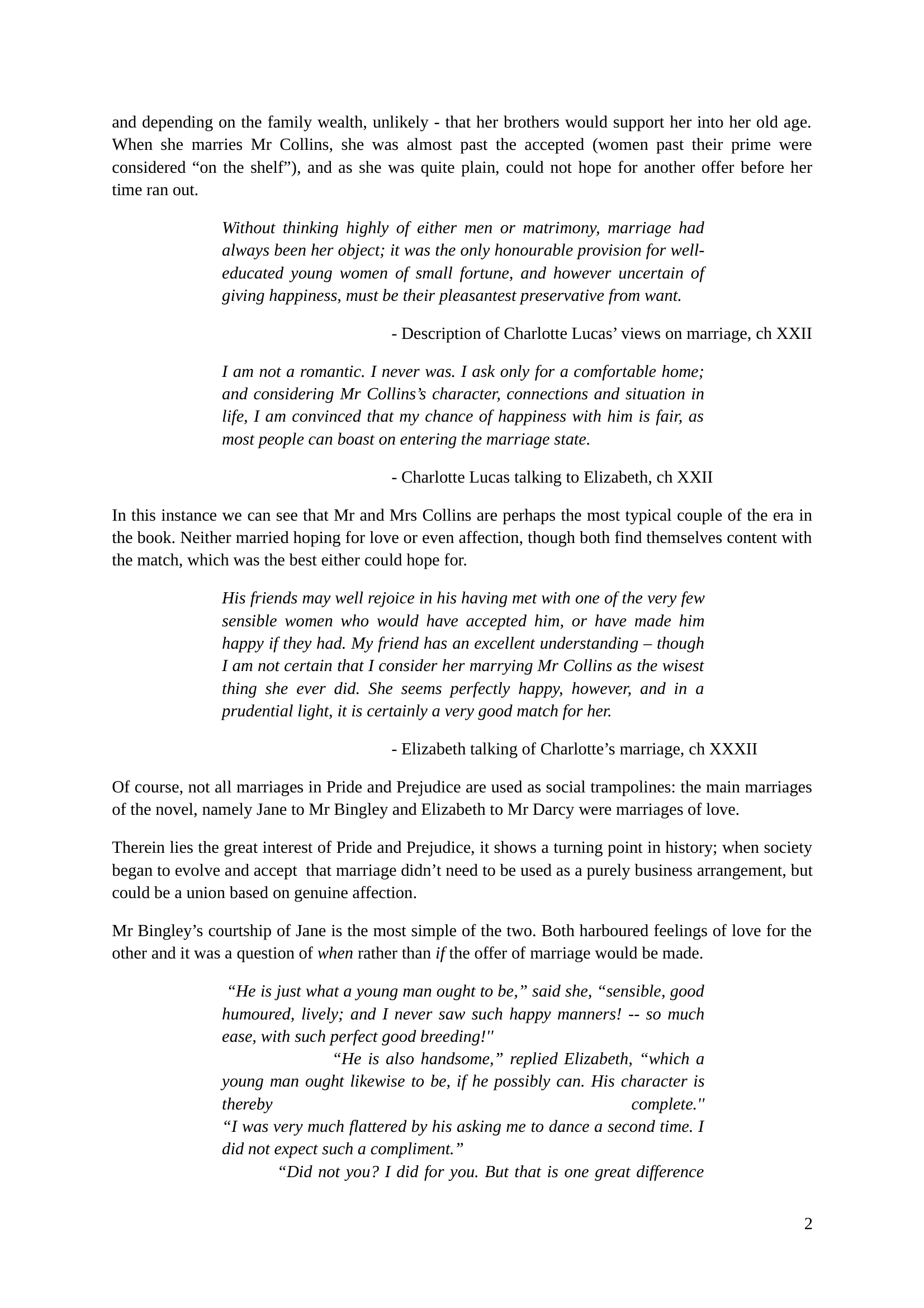How Are The Prevalent Expectations Of Marriage Challenged In Pride And Prejudice?
Publié le 01/01/2013
Extrait du document
«
and depending on the family wealth, unlikely - that her brothers would support her into her old age.
When she marries Mr Collins, she was almost past the accepted (women past their prime were
considered “on the shelf”), and as she was quite plain, could not hope for another offer before her
time ran out.
Without thinking highly of either men or matrimony, marriage had
always been her object; it was the only honourable provision for well-
educated young women of small fortune, and however uncertain of
giving happiness, must be their pleasantest preservative from want.
- Description of Charlotte Lucas’ views on marriage, ch XXII
I am not a romantic.
I never was.
I ask only for a comfortable home;
and considering Mr Collins’s character, connections and situation in
life, I am convinced that my chance of happiness with him is fair, as
most people can boast on entering the marriage state.
- Charlotte Lucas talking to Elizabeth, ch XXII
In this instance we can see that Mr and Mrs Collins are perhaps the most typical couple of the era in
the book.
Neither married hoping for love or even affection, though both find themselves content with
the match, which was the best either could hope for.
His friends may well rejoice in his having met with one of the very few
sensible women who would have accepted him, or have made him
happy if they had.
My friend has an excellent understanding – though
I am not certain that I consider her marrying Mr Collins as the wisest
thing she ever did.
She seems perfectly happy, however, and in a
prudential light, it is certainly a very good match for her.
- Elizabeth talking of Charlotte’s marriage, ch XXXII
Of course, not all marriages in Pride and Prejudice are used as social trampolines: the main marriages
of the novel, namely Jane to Mr Bingley and Elizabeth to Mr Darcy were marriages of love.
Therein lies the great interest of Pride and Prejudice, it shows a turning point in history; when society
began to evolve and accept that marriage didn’t need to be used as a purely business arrangement, but
could be a union based on genuine affection.
Mr Bingley’s courtship of Jane is the most simple of the two.
Both harboured feelings of love for the
other and it was a question of when rather than if the offer of marriage would be made.
“He is just what a young man ought to be,” said she, “sensible, good
humoured, lively; and I never saw such happy manners! -- so much
ease, with such perfect good breeding!''
“He is also handsome,” replied Elizabeth, “which a
young man ought likewise to be, if he possibly can.
His character is
thereby complete.''
“I was very much flattered by his asking me to dance a second time.
I
did not expect such a compliment.”
“Did not you? I did for you.
But that is one great difference
2.
»
↓↓↓ APERÇU DU DOCUMENT ↓↓↓
Liens utiles
- How similar and different are you from your parents?
- Jane Austen: Pride and Prejudice (Sprache & Litteratur).
- Cockroach Cockroaches are one of the oldest insects on Earth and look about the same as they did millions of years ago.
- Debating Sports Records Mark Purdy, sports columnist for the San Jose Mercury News in California, compiles a list of sports records that he believes will never be broken and a separate list of records that he thinks are soon to be eclipsed.
- Seven Against Thebes Greek The name given to the conflict between the rulers of the kingdom of Thebes and the rebels who challenged the king for the throne.

































